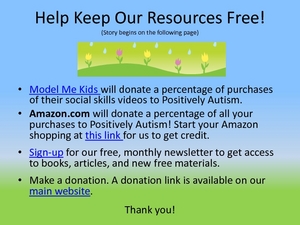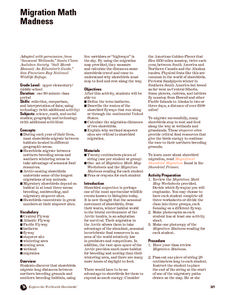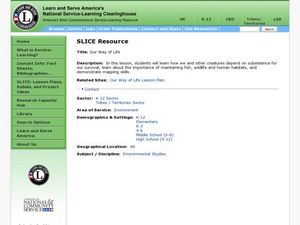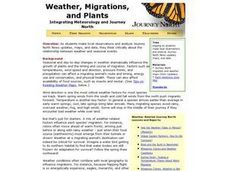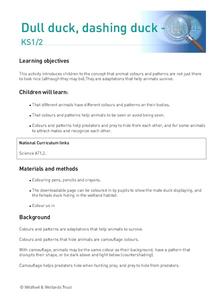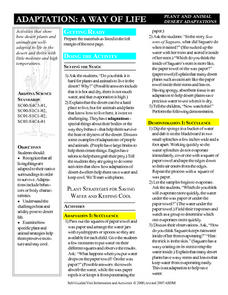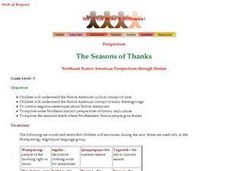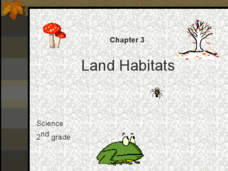Curated OER
Travis the Train: Spring Time Animals
Tag along with Travis the Train as he encounters various baby animals that live on the farm. The spring time story introduces special-needs or autistic children to the types of plants and animals found on farms, each animal is identified...
National Shooting Sports Foundation, Inc.
How Many “Un-endangered Species” Do You Know?
Can endangered species become un-endangered? Of course! Examine six lucky animals whose populations once were dwindling, but now are healthy and thriving. Learners match animal images to brief descriptions, complete a true/false activity...
Prince William Network
Migration Math Madness
A great way to incorporate math into life science, this lesson plan has learners measure migratory routes on a map and calculate the actual distance that shorebirds on the routes would cover. Learners compute the distance covered in both...
Prince William Network
Migration Headache
During this game, kids become migratory shorebirds and fly among wintering, nesting, and stopover habitats. If they do not arrive at a suitable habitat on time, they do not survive. Catastrophic events are periodically introduced that...
Curated OER
Baa, Ram, Ewe.... Sheep Tales
Students explore animal characteristics by reading animal stories in class. In this sheep habitat instructional activity, students identify the uses for sheep in our agricultural based society and the importance of wool in our economy....
Curated OER
Our Way of Life
Learners interview Native American Elders about animal migration, traditional food gathering, and subsistence. They research endangered animals, draw a game cycle, and create maps of local migration of animals.
Curated OER
Weather, Migrations, and Plants
Students research the effects of day-to-day weather on animal migrations, plant growth and other seasonal events. They consult maps, observe and record local conditions, keep journals and use their collected data check hypotheses.
Curated OER
Dull Duck, Dashing Duck
Students learn about animal camouflage. In this animal adaptations lesson, students discuss the patterns and adaptations animals use to help them survive, discuss the uses of camouflage, visit a local wetland if possible, and...
Curated OER
Desert Habitat
Students examine how desert plants and animals are adapted to life in the desert. They listen to the book, "Seasons of Saguaro," conduct experiments to demonstrate plant succulence, and create and draw an animal or plant that...
Curated OER
Plant and Animal Changes
Second graders listen as the book, "What Do Animals Do In Winter?" is read to the class. They discuss that during the winter, some animals migrate, hibernate, hide, change color, and some make changes in their bodies like growing extra...
Curated OER
Battering Through the Seasons
Students define bartering and barter to investigate supply and demand. In this bartering activity, students read A New Coat for Anna and recall how they exchanged merchandise in the story. Students complete a sequential graphic...
Curated OER
American Robin: A Robin's Menu Through the Seasons
Students read the article, A Robin's Menu Through the Seasons, taking notes and underlining key words and phrases. They create a math grid from the reading, research the animals in the article, and develop various writing assignments.
Curated OER
Travis The Train Visits the Farm in Spring
Travis the Train has made his way to a spring time farm and your special ed class gets to meet all his new friends! Each colorful page features an image of a baby animal and the sound they most commonly make. Print out this book or show...
Curated OER
Birds and Coffee
Fifth graders identify the changing seasons with how they affect animal and human behavior. They explain what migration is and why many birds migrate south for the winter. They then trace the coffee sold in their neighborhood and in...
Curated OER
Heading South
Students study the concept of animal migration with the change of seasons. They discover that migration can be hazardous, and the distance migrated can be short or long.
Curated OER
How Is A Frog Able To Swim In The Trees?
Fourth graders explore the interdependence of frogs and trees. They discuss the various things they need everyday to survive. Students select an animal from their local bioregion and research things that animal is dependent upon for...
Curated OER
Weather "Whys" Lesson 4: Spring
Students explore the attributes of spring. In this weather lesson, students collect data regarding weather from various media. Students graph simple weather data and dress animals for forecasted weather. Students discuss the...
Curated OER
The Seasons of Thanks
First graders explain the Native American cyclical concept of time
Curated OER
Exploring Animal Habitats: Winter Changes
Students explore animals during the winter months. They discuss the changes that animals make during winter in order to survive. Students discuss migration, hibernation, and staying active during winter months. Students create various...
PBS
Reading Adventure Pack: Farms
A Reading Adventure Pack features a fiction and nonfiction text—The Oxcart Man by Donald Hall and illustrated by Barbara Cooney and Farming by Gail Gibbons. Following the readings, scholars make a collage showcasing foods farmed from...
Curated OER
Responses to Changes in the Environment
Fourth graders study ecosystems, and see how plants and animals must adapt to changes in their environment in order to survive. Pictures of the snow shoe hare in the winter and summer are shown. Learners determine that the change in...
Curated OER
Land Habitats: Grade 3 Science
Build your students scientific vocabulary with this slide show on land habitats. Each slide provides a vocabulary word, image, and definition of a term common to habitats and the environment. Great for science class or as comprehensible...
Curated OER
Hickory Dickory Dock: The Biological Clock
Young scholars investigate the effect of day length on animal migrations. They view a Powerpoint presentation, identify their own personal migrations and cues, answer discussion questions, and test a hypothesis about seasons.
Curated OER
The Earth in Space
Students use computer images to explain why the Earth has seasons and examine the phases of the moon. They create 3-D images and present them to the class. They answer a series of questions at the end of the lesson.
